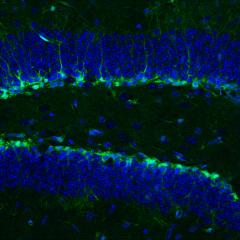We investigate the mechanisms governing the lifelong production of neurons in the adult brain (adult neurogenesis).
Physical exercise is one of the strongest positive regulators of adult neurogenesis. However, despite being discovered over 20 years ago, and being extensively studied ever since, the mechanism which underlies this response remains unknown.
The overarching goal of our research is to identify the mechanism by which exercise increases neurogenesis, and to apply this knowledge to identify novel strategies to reverse the neuronal loss that is associated with physiological ageing, stroke, motor neuron disease and Alzheimer’s disease.
Group leader

Associate Professor Tara Walker
+61 7 3446 6498
t.walker1@uq.edu.au
UQ Researcher Profile
Latest news
What inspires Dr Walker
We are trying to understand the mechanism by which exercise boosts new neuron generation in the adult hippocampus (adult neurogenesis).
Using exercise as a model of increased neurogenesis, we have identified two novel strategies to increase neurogenesis and improve cognitive function - exercise-induced platelet activation and selenium-mediated ferroptosis.
We are now applying this knowledge to determine whether these interventions can be applied to boost neurogenesis in cases of neuronal loss including physiological ageing, Alzheimer’s disease, stroke and motor neuron disease.













